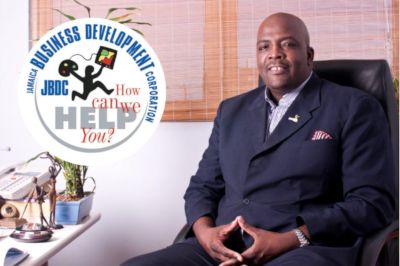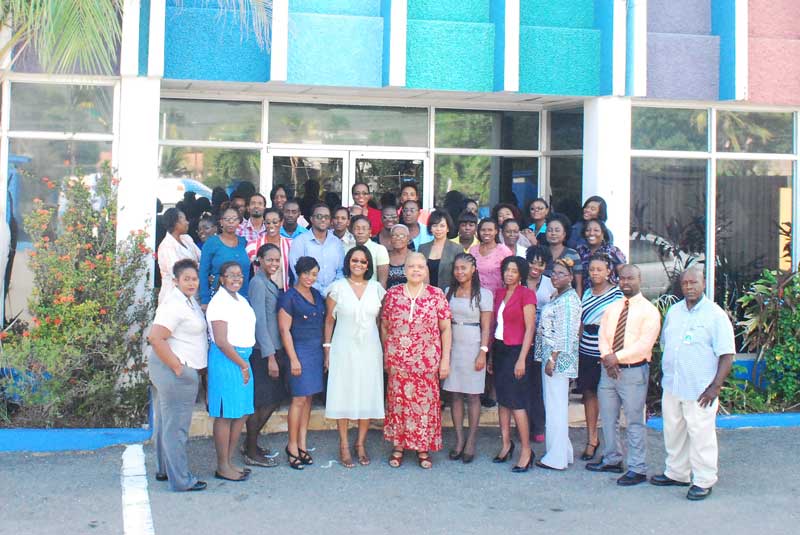Business View Caribbean profiles Jamaica Business Development Corporation
Supporting Jamaica’s entrepreneurs
The population of Jamaica is just shy of three million people. According to Harold Davis, the Deputy CEO of the Jamaica Business Development Corporation (JBDC), 300,000 of them would like to go into business for themselves. By any estimate, that is a significant number of budding entrepreneurs in a relatively small, and not very wealthy, country. But for those individuals who do wind up tackling the daunting task of establishing themselves as the owner/operator of their own enterprise, a very large majority of them will be in the Micro, Small, and Medium-sized sector (MSME) of the economy.
The mission of the JBDC is to provide a wide range of business and technical support services for that vital part of Jamaican society, and to pursue development policies that foster sustainable modernization and growth of this productive sector of its economy. The JBDC helps MSMEs survive and prosper by providing them with business advice, consultancy services, counseling, training, networking opportunities, and a broad range of other operational, brokering, marketing, and developmental products and services. Over the years, more than 2000 Jamaican businesses have taken advantage of JBDC’s many services and programs.
 Valerie Veira, JBDC’s CEO details the company’s formation: “We are a limited liability company, owned by the government of Jamaica and we fall within the portfolio of the Ministry of Industry, Investment and Commerce. We started out as a technical department within Jamaica Promotions Limited which was an investment agency of Jamaica. And the government, at the time, thought that it would be important to separate us, for us to focus specifically on leading the development of the Micro, Small, and Medium-sized enterprise sector, which is really the backbone of all economies, whether it’s Jamaica, or the States, or the region. They wanted a special focus on the whole development of this particular sector.”
Valerie Veira, JBDC’s CEO details the company’s formation: “We are a limited liability company, owned by the government of Jamaica and we fall within the portfolio of the Ministry of Industry, Investment and Commerce. We started out as a technical department within Jamaica Promotions Limited which was an investment agency of Jamaica. And the government, at the time, thought that it would be important to separate us, for us to focus specifically on leading the development of the Micro, Small, and Medium-sized enterprise sector, which is really the backbone of all economies, whether it’s Jamaica, or the States, or the region. They wanted a special focus on the whole development of this particular sector.”
Veira also explains JBDC’s atypical business model: “From the beginning, it was always envisioned that we would be a company, in the sense that we are more autonomous than if we were part of a ministry. For example, we are autonomous in that we can drive our own processes. We have that little bit more room to maneuver and to develop programs in a different kind of way. There’s not a company like JBDC. How we’re structured and how we do what we do is a very innovative model, even from the first day, 14 years ago.” Davis concurs: “The government owns other Limited Liability Companies but in terms of functionality and mandate there is a uniqueness to us.”
JBDC has two revenue streams. “The main one comes from the government of Jamaica, and we also are required to earn a portion of our revenue,” says Veira. “So we provide valuable services which we charge for. We manage programs, many of them from international agencies like the World Bank, the Inter-American Development Bank, the European Union, and so on. Of course, there’s a management fee attached to that. But the reason that we always will be on the government’s budget is because we are charged with development, and development is always supported by the government.”
JBDC’s focus is mainly on the productive aspect of MSMEs, “meaning that we have a particular interest in the development of that component of the sector that will be producing, instead of trading on imported items,” Veira notes. “We do a lot of work in the manufacturing sector. We still provide services to those people who are in trade and distribution, but we are particularly focused on the productive aspect of the sector, including the creative industries and other emerging industries.
“Our main entry point is our business advisory unit, which is a group of persons trained to assist our clients in filtering through and identifying viable business opportunities; to help them develop their business plans, and their business models; and to help them to formalize those businesses, which includes registering into the regulatory agencies that are required by the government. So there is a lot of that kind of hands-on preparation for them to be really successful in business.”
Davis adds, “We offer a number of other technical services that have to do with product development – we have a number of designers and engineers on staff to assist persons to literally develop their product to international standards, their branding strategy, their collateral material, their formulations (if it’s food, for instance), and their process development, and management, as well. So, that is our main thing, and we have the staff and expertise to do that.”
“We are the technicians,” says Veira.”We are the people who have the toolkit with all the equipment and the instruments. We have 120 staff members and it’s a very highly-skilled team. We also have our own incubation system, because while we have a brick-and-mortar incubator, for some of the clean industries like fashion, and craft, and gift and food, we go to the location of the producer and help them through the incubation period. We work across private and public sectors to whatever agency or organization that has any service that can improve and enhance the basket of services that we provide to, or is required by, our client group.”
While JBDC’s Head Office is in Kingston, Veira also talks about how the company’s reach extends across the entire island. “We have satellite offices in six other locations to establish connectivity to our clients, so we’re out in the field. Once a month we have been going to different parishes with what we call our Mobile-Business Clinic Initiative –where we bring the agencies and our JBDC team and we stay in a parish for two to three days, set up a tent, and provide hands-on, on-the-ground, immersion with our clients. We give information and services and also get information that can impact on policy development as we guide our Ministry in amending or developing policies that can help in further developing the sector. This is how we work. We also reach out to associations, chambers of commerce, the manufacturers’ association, and small business associations.”
One example of a very successful JBDC program is its Proposal Writing Workshop Series. This workshop was designed and developed using a practical results-based approach and was offered for the first time in 2013. The workshop equips candidates with the practical know-how of writing winning project proposals, and empowers them to develop solid proposal documents, while learning how to strategically identify targeted donors. To date, over 90 private, public, and civil society organizations have been exposed to over 3000 hours of training in proposal writing. “They might have good ideas but don’t know how to present them,” Veira explains. “We bring the agencies on board to find out what their needs are and we assist and guide and develop the skills for the small companies that come to that workshop. It has been a winner, and we have programmed two a year. People have actually been successful in obtaining funding based on how they’re appropriately presenting their ideas.” Successful may be an understatement. Within five months of hosting the first workshop, over $17 million in grant funding was awarded to workshop participants.
JBDC also sponsors a Small Business Expo, which has grown markedly over the years. All of the stakeholders that relate to the MSME sector get together to share ideas and get current information on any new services or developments. Most importantly, they network, or as Veira states succinctly: “People speak to each other and find that they can link and find benefits on both sides.”

“It has really become the marquee, small business event on the national calendar,” relates Davis. “Before we started it eight years ago, there was no such event. Every year we see an additional amount of persons. This year it was about 1,000 people who came to the event. And every agency – both private and public – that has to do with providing services or products for small business are there or want to be there.” In fact, according to Veira, next year’s Small Business Expo is already booked and companies are vying with one another to become its main sponsor.
The JBDC also is involved in helping to educate Jamaica’s future entrepreneurs. “We actually teach degree programs in the universities, so we are helping to develop a new crop of entrepreneurs who come out even better prepared than the ones we might be working with at this time,” says Veira. “So we can really have this forward movement that the government desires in the sector for the evolving, emerging industries. If you come to Jamaica, all the educational institutions, even the high schools are talking about entrepreneurship training.”
According to Davis, the more sophisticated its incipient entrepreneurs become, the more JBDC’s services will have to grow and expand to meet new demands – and the more the company will draw on the support of its wide cross-section of partners. “What is happening is the emerging of the new type of entrepreneur – the more informed entrepreneur that needs different types of services rather than basic information. Perhaps they need to know how to negotiate new barriers of entry into new industries, into new markets. We have a cadre of business-service providers right across the island; individual consultants or groups of consultants that work with us that we have sensitized into our methodology for technical assistance. That group allows us to expand our scope and our reach of services as required.” Veira adds: “We see ourselves as a national network broker for the sector. Our aim is to ensure that the services are available and that the clients can be linked with those entities, organizations, or persons who can provide those services.”
While both Veira and Davis are happy with the many successful programs that the JBDC offers, they still have agenda items they wish to satisfy. Viera would like to expand services to doctors and lawyers, whose businesses, most of the time, fall within the MSME sector. In addition, “there needs to be a revolution in the kind of financial products that are available for the sector,” she declares. “It’s very easy to get funding to buy a car or a house, but to buy a machine is still a challenge. For us, this is a critical ingredient.” She also wants to explore the development of the creative industries and how those small businesses can use their intellectual property as collateral for loans.
Davis declares his future aspirations for the JBDC, as well: “We want to be seen as the lead entity in the transformation of our entrepreneurial landscape. And we’re seeing the emergence of a new type of entrepreneur based on the work that we’re doing. We are seeing a maturing of the sector which is very encouraging for us and we would want to be seen and recognized as the lead institution that has led to this transformation.”
Considering all the work that the JBDC has done, and continues to do, in providing necessary services to Jamaica’s Micro, Small, and Medium-sized businesses, it is likely that Davis’ desire for recognition will be easily met.
AT A GLANCE
WHO: Jamaica Business Development Corporation
WHAT: Provider of business support services for Jamaican businesses.
WHERE: Head office in Kingston, Jamaica
WEBSITE: www.jbdc.net
PREFERRED VENDORS
DIG DIGITAL?



